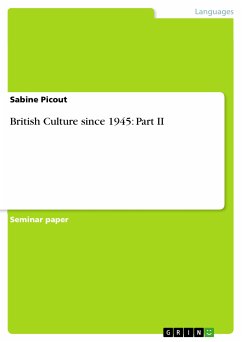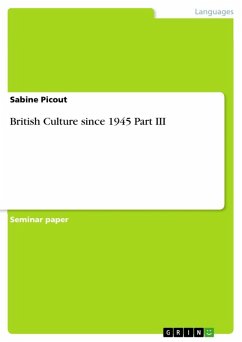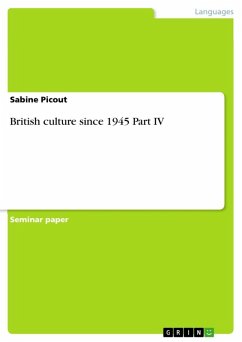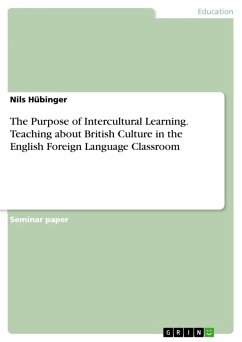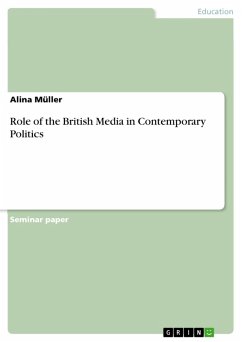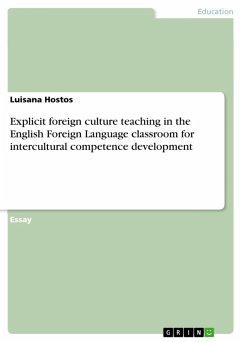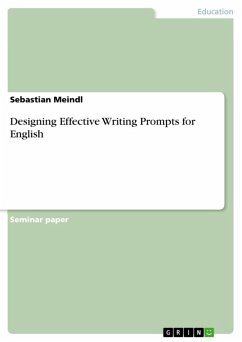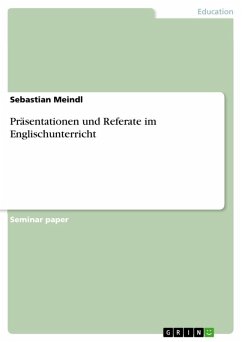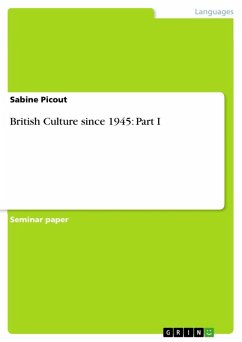
British Culture since 1945: Part I (eBook, ePUB)
Versandkostenfrei!
Sofort per Download lieferbar
Statt: 17,95 €**
13,99 €
inkl. MwSt. und vom Verlag festgesetzt.
**Preis der gedruckten Ausgabe (Broschiertes Buch)
Alle Infos zum eBook verschenkenWeitere Ausgaben:

PAYBACK Punkte
0 °P sammeln!
Seminar paper from the year 2004 in the subject Didactics for the subject English - Applied Geography, grade: sehr gut, University of Innsbruck (Translationswissenschaft), language: English, abstract: This paper gives an overview on the most important cornerstones of British culture from 1945 to 1970 and gives answers in bullet points to following questions: I. Identify 6 aims of the book (British Culture - An Introduction (David Christopher, Routledge 1999)). II. In which practical ways can you access information and comment on the Arts in Britain today? III. The Social and Cultural Context: ...
Seminar paper from the year 2004 in the subject Didactics for the subject English - Applied Geography, grade: sehr gut, University of Innsbruck (Translationswissenschaft), language: English, abstract: This paper gives an overview on the most important cornerstones of British culture from 1945 to 1970 and gives answers in bullet points to following questions: I. Identify 6 aims of the book (British Culture - An Introduction (David Christopher, Routledge 1999)). II. In which practical ways can you access information and comment on the Arts in Britain today? III. The Social and Cultural Context: Explain the post-war impact in Britain of ethnicity, feminism, youth. IV. Why is 1979 a radical turning-point in arts subsidy? V. 1945 - 1970 --> 1. What did the 1951 Festival of Britain mark? 2. Explain the roots of Reggae in Britain. 3. Which image of London's Notting Hill is offered in the film of the same name? 4. What do Benjamin Britten, Henry Moore, E.M. Forster and Doris Lessing have in common? 5. 5) Explain the socio-cultural context of Penguin's Lady Chatterley Trial. 6. Which social issues did 'social realism' in the arts deal with in the mid/late 1950s? 7. Explain how dissent was introduced into the arts. 8. Which cultural viewpoint did F.R. Leavis hold? Compare his with Richard Hoggart's. 9. Which socio-cultural changes did Labour usher in after 1964? 10. Find out about Margaret Drabble's novel The Millstone. How does it relate to pp 6-7? 11. In which ways are the following representative of the mid-1960s? James Bond, George Best (born in 1946), Twiggy, The Avengers, The Beatles, The Rolling Stones.
Dieser Download kann aus rechtlichen Gründen nur mit Rechnungsadresse in A, B, BG, CY, CZ, D, DK, EW, E, FIN, F, GR, HR, H, IRL, I, LT, L, LR, M, NL, PL, P, R, S, SLO, SK ausgeliefert werden.




